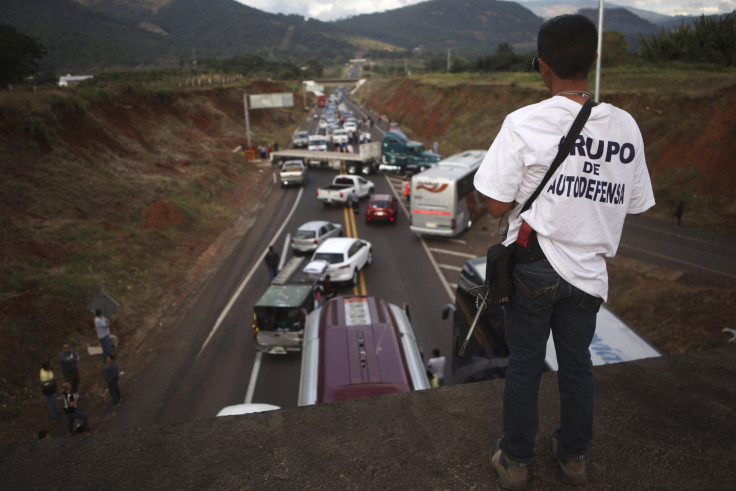Mexico's Vigilantes Resurface, Faulting Government For Failing To Take Down Knights Templar Cartel

Mexico’s vigilantes are back, and angry. The so-called self-defense groups that rose up against drug cartels in the turbulent state of Michoacán last year regrouped over the weekend, took up AK-47s, and blocked roads in several cities, announcing their return in full force -- a development that underscores how the security situation in parts of Mexico is still dire, despite the president's two-year-old promise to fix it.
The vigilantes, known as “autodefensas,” took over roads in six cities across Michoacán state on Sunday, saying the federal government was failing to protect them from the Knights Templar cartel and another organized crime group known, strikingly, as Los Viagras. The vigilantes, many of whom for months have been part of a specialized military unit called the Rural Defense Forces, also complained about not receiving salaries or adequate support from the state.
“Mr. President Enrique Peña Nieto, the people of Michoacán are mourning because the [Knights Templar] continues to kill, ambush and kidnap the autodefensas and the Rural Forces,” read a protest placard, according to Mexico’s Reforma news agency.
The autodefensas, made up primarily of farmers and other residents in the rural areas of Michoacán, began surfacing last year as armed community forces dedicated to taking back their towns from Knights Templar control. The groups, arguing that local police were too corrupt or inept to protect their communities, posed a conundrum for the federal government, which eventually folded them into the Rural Defense Forces while pressuring their leaders to disarm.
But the vigilantes have continued to occupy an uneasy space within the state as they held up their tenuous alliance with the military. Some autodefensas, including leader José Manuel Mireles, have actively resisted disarming. Mireles was arrested in June on charges of carrying unauthorized weapons. Meanwhile, some observers have accused some of the vigilante groups themselves of being linked to criminal organizations.
Some autodefensas took to Facebook to announce the resurgence of their campaign, using the page of a group called Valor Por Michoacán. “We hold [Michoacán Security] Commissioner [Alfredo] Castillo responsible as the direct culprit, along with the federal government, for ignoring the deaths left by this new war against organized crime,” they wrote Sunday.
Castillo, the designated head of the Rural Defense Forces, announced on Twitter that the vigilantes dismantled the road blockades Sunday after holding a dialogue with state officials. But the autodefensas said Sunday they would not back down.
“At approximately 8 p.m. the united, genuine autodefensas will enter Apatzingan to search, street by street, for members of the Los Viagras cartel, and we will come for them in Pinzandaro and Uruapan in due time,” they wrote.
The events in Michoacán come as Mexican lawmakers are set to debate a controversial amnesty law for imprisoned vigilantes accused of crimes committed in February through September of this year. The law’s backers argue that the autodefensas were imprisoned based on political motivations.
The unrest also comes amid escalating pressure on Peña Nieto’s government as it continues to grapple with mass anger over the presumed deaths of 43 students in Guerrero state, which borders Michoacán on the east.
© Copyright IBTimes 2024. All rights reserved.












